Goat Deworming Schedule
If you raise goats, keeping them free of parasites is most likely always on your radar. To help, we have a goat deworming schedule that you can use to create a routine for your herd. Keep the pests away and encourage a healthier herd of goats on your homestead.
How to Raise Dairy Goats that are resilient, healthy, and producing loads of amazing milk for you and your family.
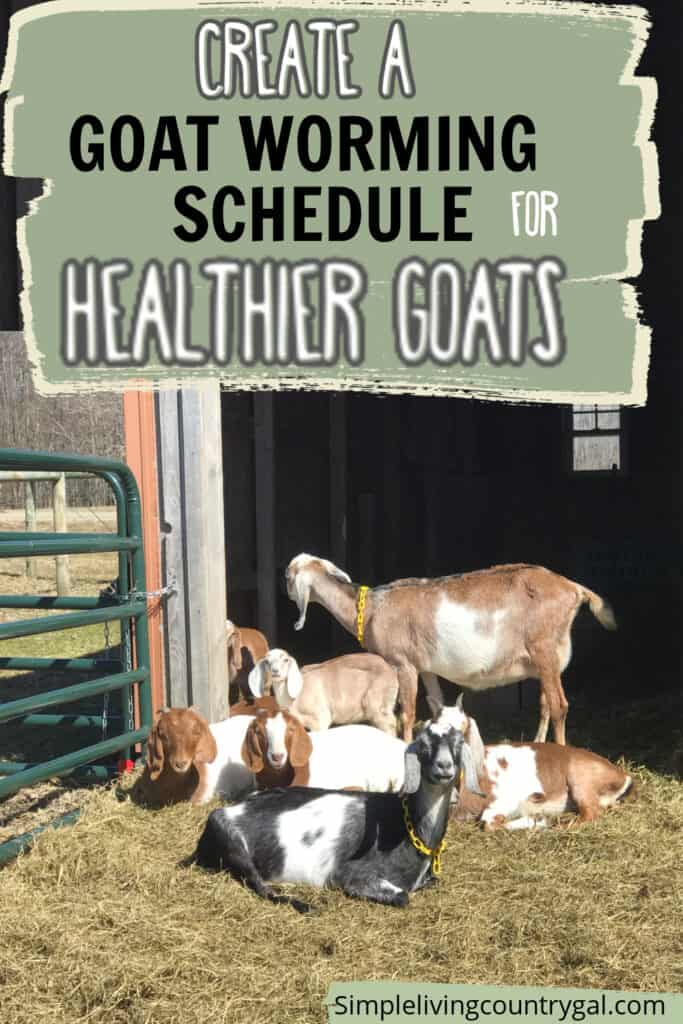
To ensure your dairy goats remain healthy and productive, a consistent deworming schedule is important. Parasites can greatly affect the overall well-being of your herd, including their milk production, weight gain, and overall condition. This guide will help you to create a deworming routine that fits where you live, the size of your herd, and your homesteading setup.
What are the symptoms of worms in goats?
Goats that have a worm overload may show a variety of symptoms.
• Weight loss: Despite a normal or even increased appetite, goats may lose weight due to worms causing damage to their digestive tract.
• Anemia: A common sign of worm infestation is anemia, which may make the goat lethargic and weak. The lower inner eyelid color can be a good indicator; a pale pink or white color often indicates anemia.
• Diarrhea: Worms can disrupt the normal function of a goat’s intestines, leading to diarrhea. Persistent diarrhea in goats should not be ignored as it could be a sign of a serious worm infestation.
Be sure to grab the FREE Goat Health Checklist below!
• Bottle Jaw: This refers to a swelling under the jaw, which is a sign of severe worm infestation.
•Rough Coat: A goat’s coat that was once smooth and shiny may become rough and dull due to poor nutrition absorption caused by worms.
Regular monitoring for these symptoms can greatly help in maintaining the health of your goat herd and ensure optimum milk production.
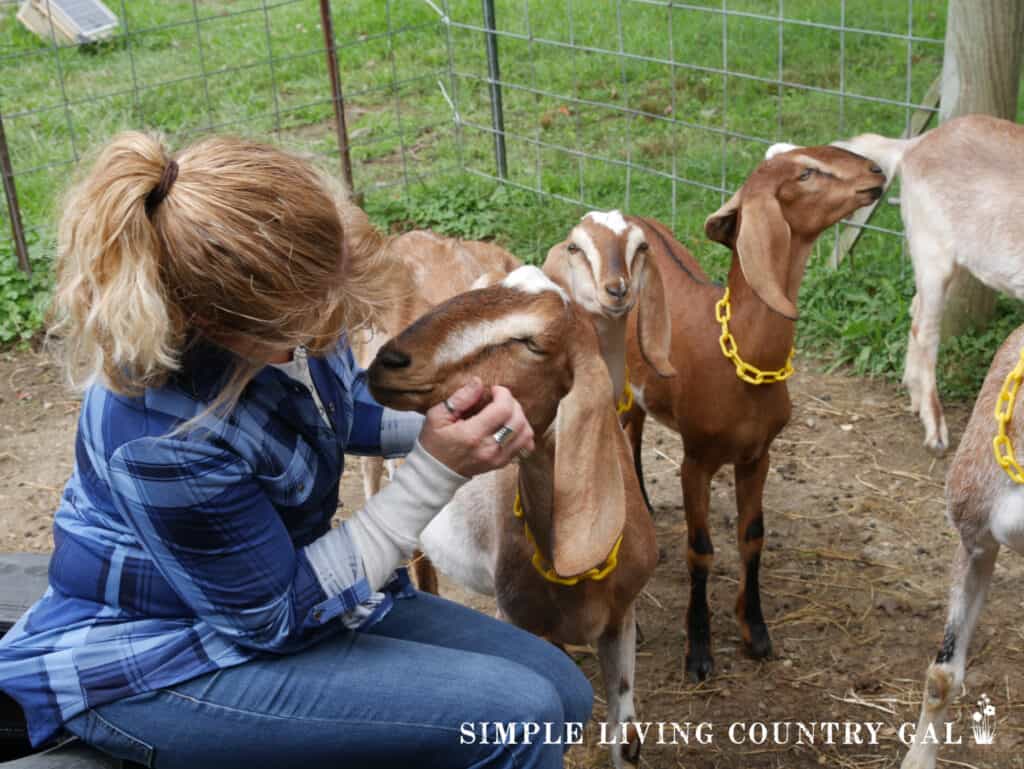
What worms can goats get infected with?
Goats can get infected with a variety of worms, each causing different types and severities of symptoms.
Stomach worms or Barber’s Pole Worms: This is one of the most dangerous worms for goats. They suck blood from the goat’s abomasum, leading to severe anemia and often death if not treated timely.
Intestinal Worms: These worms infect the small intestine, often causing diarrhea and weight loss.
Lungworms: Known to inhabit the lungs of goats, these worms can cause respiratory symptoms, such as coughing and difficulty in breathing.
Liver Fluke: These worms live in the liver of the goat, causing reduced weight gain and milk production.
Tapeworms: Tapeworms can be quite large and may cause blockages in the intestines, slow growth, and poor condition in goats.
It’s crucial to note that some forms of these parasites are resistant to certain dewormers, so it’s vital to rotate the type of dewormer used and consult with a veterinarian for the most effective treatment plan.
How do worms affect milk production in goats?
Worm infestations or overloads in goats can greatly impact milk production, primarily by affecting the overall health of the goat. Parasitic worms, such as the Barber’s Pole Worm or Liver Fluke, cause anemia, weight loss, and lack of energy, leading to a drop in milk production. The energy and nutrients that the goat would normally use for milk production are instead used to fight off infections.
The poor nutrient absorption only makes this matter worse. Severe worm infections can cause physical discomfort and stress to the goat, which is known to impact milk production negatively. Having a deworming schedule and watching for signs of worm infestation is essential to ensure you are getting the most milk from your herd.
Dairy Goat Supplies:
Estink Manual Goat Milking Kit, 3L Plastic Portable Household Goat Milking Machine Manual Operation Sheep Cow Milker Kit Hand Pump Milker Machine for Farm Household Cow Goat Milking (for Sheep)




![WIDE Mouth Mason Jar Lids [16 Pack] for Ball, Kerr and More - White Plastic Storage Caps for Mason/Canning Jars - Leak-Proof](https://easyproductdisplays.com/wp-content/uploads/2017/07/buy6.gif)
Creating an Deworming Schedule for Goats
Having a deworming schedule is key to maintaining a healthy and productive goat herd as it can help prevent worm infestations. However, there is not one set schedule that will work for every setup and location. This guide is more general but still a great place to start out customizing a plan for you.
Different types of wormers
There are a few different types of wormers for goats we will be talking about two in this article.
Chemical worming
The most common dewormer is chemical. There are many on the market, and choosing one will depend on what works in your area. I suggest asking your vet for advice on which ones to start out with.
Chemical dewormers can be administered topically, orally, or by injection. You can get most dewormers at your local feed or livestock store, and how to administer each will be on the label. You can find more info on these types of wormers here.
Herbal Worming
For our herd, we mainly use an herbal wormer and have found that keeping it in our herd care routine greatly reduces outbreaks and the need to use a chemical solution.
Herbal wormers usually contain a mixture of various plant-based ingredients that have been shown to have anthelmintic (anti-parasitic) properties. These natural ingredients work by either paralyzing or killing the worms, making them easier for the goat’s body to eliminate.
Some commonly used herbal wormer ingredients include garlic, black walnut hulls, wormwood, and pumpkin seeds. These ingredients can be fed to goats in a powder or pellet form, mixed into their feed, or given as an herbal tea.
When using herbal wormers, it’s important to follow the recommended dosages and frequency based on your goat’s weight. It may also be necessary to rotate between different types of herbal wormers to prevent resistance from developing.
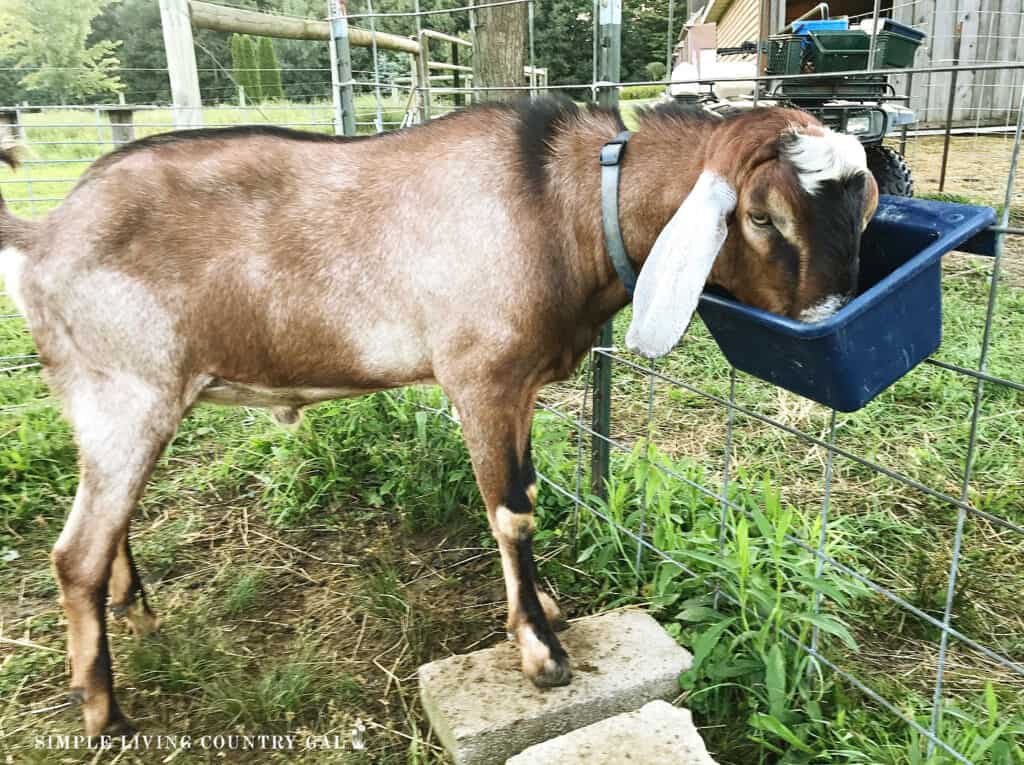
How to Set up a schedule for deworming your goats:
#1. Contact your vet, local extension office, or a goat farmer in your area and ask them what months of the year you should be aware of possible worm outbreaks.
#2. Make a record sheet for each member of your herd. This is important so you can track who needs extra worm care and who is more resilient.
#3. Decide on the type of wormer you will use. For this part, you will want to know what others are using successfully in your area. Ask your vet for advice on where to start. If you decide to use a herbal option, you will need to worm much more frequently as to a chemical option.
#4. Make a schedule.
- Using a planning setup of your choice (wall calendar, phone app, or record journal), write out a schedule for worming your herd.
- Stick to 3 months at a time until you are able to solidify your schedule.
- Write in the dates for worming. If you are using chemical dewormers, then seasonally may be all you need. If you are using herbal wormers you may want to dose your goats weekly.
- Do routine fecal test to ensure everyone is healthy.
- Adjust your schedule as needed.
Monitoring for Parasites
Having a worming schedule is only part of maintaining a healthy herd; you will also want to do regular fecal checks. Fecal exams can help determine the effectiveness of your worming program and detect any potential parasite issues early on.
Fecals should be done at least every three months, but more frequently if you have a high-risk pasture or herd. This will allow you to adjust your worming schedule or herbal treatments as needed.
To perform a fecal exam, collect a fresh stool sample from each goat and take it to your veterinarian or a local lab for testing. They will analyze the sample for any parasite eggs and provide you with a report of their findings.
Pasture Management
Proper pasture management plays a key role in having a herd that can fight off worm loads naturally. Parasites thrive in moist, wet, and warm environments, so keeping your pastures clean and dry can greatly decrease the chance of your goats becoming infected. You can do this by timing your herd’s graze time until the sun has had time to dry off your area or incorporate rotation grazing on your homestead.
Rotational grazing is where goats are moved to different pastures every few weeks, which can also help reduce parasite infestations. This prevents goats from grazing on the same contaminated pasture for extended periods of time. We started incorporating rotational grazing with our own herd and have seen a significant drop in worm outbreaks.
You can read more on how we rotationally graze our herd here.
Having a deworming schedule and a grazing plan is essential for the health and well-being of your goats. Following these tips, you can ensure that your entire herd, from baby to buck, is protected and healthy.
Remember to always consult with your veterinarian for specific recommendations for your goat’s individual needs. With proper care and attention, you can keep your goats happy, healthy, and parasite-free.
More Goat Health Resources:
- Goat Care Checklist
- Introducing New Goats to the Herd
- What are the Best Minerals for Goats


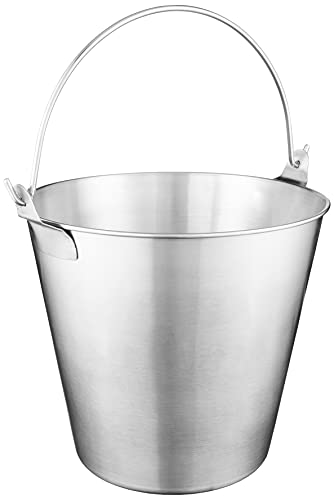
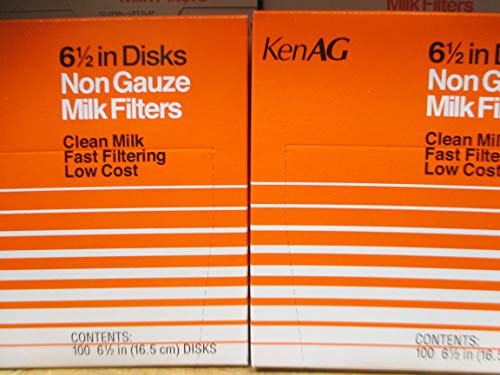


![WIDE Mouth Mason Jar Lids [16 Pack] for Ball, Kerr and More - White Plastic Storage Caps for Mason/Canning Jars - Leak-Proof](https://m.media-amazon.com/images/I/315hC2lw8+L._SL500_.jpg)
